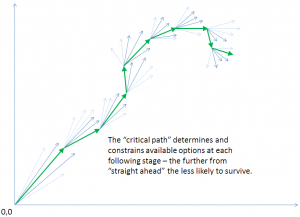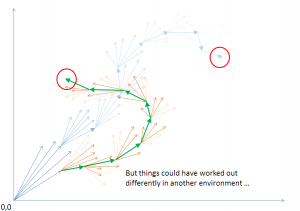Evolution by natural selection: Difference between revisions
Amwelladmin (talk | contribs) No edit summary |
Amwelladmin (talk | contribs) No edit summary |
||
| Line 1: | Line 1: | ||
{{a|Technology|}}Firstly, bad metaphor watch: be careful of using the word “evolve” when you mean “develop”. Evolution is the process of spawning and dying, and leaving it to the obstreperous gods of Earth, Wind, Fire and Water to figure out which, [[if any]], of your progeny should survive. Now, if you’re the COO of an established financial services organisation, we respectfully submit that throwing | {{a|Technology|}}Firstly, bad {{t|metaphor}} watch: be careful of using the word “evolve” when you mean “develop”. [[Evolution]] is the process of spawning and dying, and leaving it to the obstreperous gods of Earth, Wind, Fire and Water to figure out which, [[if any]], of your progeny should survive. | ||
Now, if you’re the COO of an established financial services organisation, we respectfully submit that throwing your infants unchaperoned into the mindless ravenous maw of nature to see how they get on while you shuffle off your mortal coil is ''not'' what you should be aspiring to put your organisation through. Evolving involves ''you'' dying, and the — ah — lion’s share of ''your children'' dying too, for the betterment of some unseen replicating subcomponent of the greater whole.<ref>Though, come to think of it, what — or ''who'' — might ''that'' be?</ref> Dear COO: your job is to ''protect'' your firm from the red claws and teeth of nature, not to ''feed'' them. | |||
===The contrarian piece=== | ===The contrarian piece=== | ||
Revision as of 15:48, 22 August 2020
|
JC pontificates about technology
An occasional series.
|
Firstly, bad metaphor watch: be careful of using the word “evolve” when you mean “develop”. Evolution is the process of spawning and dying, and leaving it to the obstreperous gods of Earth, Wind, Fire and Water to figure out which, if any, of your progeny should survive.
Now, if you’re the COO of an established financial services organisation, we respectfully submit that throwing your infants unchaperoned into the mindless ravenous maw of nature to see how they get on while you shuffle off your mortal coil is not what you should be aspiring to put your organisation through. Evolving involves you dying, and the — ah — lion’s share of your children dying too, for the betterment of some unseen replicating subcomponent of the greater whole.[1] Dear COO: your job is to protect your firm from the red claws and teeth of nature, not to feed them.
The contrarian piece
Now, that out the way, try this. Evolution by natural selection — Darwin’s dangerous idea — is the greatest of all scientific achievements — or not science at all?
Let’s see if this works.
In essence,[2] evolutionary theory is that organisms evolve through a mindless, iterative process — an algorithm. Each iteration has three components:
- Variation: Random but minor variations in organisms, which happen through recombination (mixing of parental genes) or mutation (errors in copying genes).
- Selection: Selection of those variations that are best suited to to the prevailing environment — this will happen naturally; those variants that are less suited will, ipso facto, fare worse and eventually die out.
- Heredity: The features conferring fitness tend to be retained and passed on in successive versions of each reproducing organism. This happens through parental combination.
The process is effectively “trial-and-error” or “generate-and-test”: The problem is how best to survive and replicate in the given environment; the “best” solutions for the process continuously generate new trials, test them, discard failures, and keep the successes.


Observations on the evolutionary process
- It is profoundly stupid: It requires no insight, intelligence or imagination. While the inputs are complex and unpredictable, the steps followed are simple, and algorithmic. It is a suitable use for a Turing machine. It requires no educated guesses, no knowledge of the environment or the laws of physics. But by the same token it cannot retrospectively correct variations which were successful but which, on subsequent adaptations, have turned out to be constraints or design flaws. You need intelligence for that.
- It is profoundly wasteful: It requires trial and error, but because it is stupid, it is entirely unsupported by intelligent insight. It cannot hypothesise that variation x will be more successful than variation y, and so opt for variation x;
- It is profoundly inefficient: the iterative nature of the evolutionary process is highly unlikely to produce design economy: Each new adaptation depends on, and is layered on top of, all earlier adaptations. The more more recent an adaptation is, the more susceptible it is to successful mutation. Mutations in basic characteristics on which a lot of subsequent bio-engineering depends are likely to be catastrophic. A design flaw that is critical will lead to extinction. A non-critical design-flaw may be that layering work-arounds over earlier design flaws, but there is no mechanism in evolution (other than fiat) to “improve” an underlying design.
- It is path-dependent: Where any step can go depends on where you start and what are the prevailing environmental conditions. The further back down the chain you go,the more divergent subsequent paths can be. This means it is survivor bias writ large, and also that:
- It is profoundly contingent: “fitness” depends not just on the organism’s own adaptations, but the changing environment, which comprised:
- (a) the organism itself;
- (b) all other (evolving) organisms in the biosphere; and
- (c) changing climate, whether through:
- (i) normal environmental fluctuations (weather, seasonal change, viruses);
- (ii) evolving organisms consuming resources and competing with each other; or
- (iii) extraordinary climactic events (earthquakes, volcanoes, meteorites, invasions of “aliens”).
See also
References
- ↑ Though, come to think of it, what — or who — might that be?
- ↑ See https://en.wikipedia.org/wiki/Universal_Darwinism